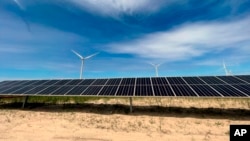Renewable energy saw a record increase in 2022 with capacity up almost 10% globally, the International Renewable Energy Agency said Tuesday, warning it was not enough to limit climate change.
Last year, 83% of new power generation capacity came from renewable sources, the IRENA agency said as it announced a 9.6% increase in renewables capacity globally.
Solar, mainly photovoltaic, and wind still account for 90% of new construction. While the agency noted a slowdown in the wind sector compared with the previous two years, production capacity still rose by 9% and solar by 22%.
Hydroelectricity remains the sector's largest source, accounting for 37% of the total capacity and producing 1,256 gigawatts, according to the Renewable Capacity Statistics 2023 report.
Total production capacity, including all renewable sources, stood at 3,372 GW at the end of 2022.
"This continued record growth shows the resilience of renewable energy," said IRENA director general Francesco La Camera.
"But annual additions of renewable power capacity must grow three times the current level by 2030, if we want to stay on a pathway limiting global warming to 1.5 degrees Celsius," he said.
"As energy demand is expected to rise in many regions of the world, the energy transition requires a step change that delivers a strategic shift beyond the decarbonization of the supply side," he said.
Asia is the geographic area that saw the greatest growth in renewable facilities last year.
China was the main contributor with 141 GW of new renewables capacity, nearly half of the global total of 295 GW of new capacity.
Europe and North America gained 57.3 and 29.1 GW respectively. In Africa, it increased by 2.7 GW.
The Middle East saw 3.2 GW of new electricity production put into service with unprecedented regional growth at 12.8%.




